Drone technology is rapidly heading towards the mainstream, whether it's television firms using them to film sporting events or Amazon researching how they might facilitate deliveries to remote areas. Now a new use for the autonomous flying machines has appeared in China: spotting students who are trying to cheat in the exam room.
Quartz has the story of an anti-cheating drone being used in the province of Luoyang. Rather than spotting students with scribbles on their arm, the drone is actually scanning for radio waves - apparently it's not uncommon for desperate pupils to have an earpiece hidden in their ear that can then be used to feed them the correct answers.
The six-propeller drone floats 500 metres above the test site and creates a 'dragnet' for radio waves. If patterns of communication are discovered, the drone is able to pinpoint the offender's desk, and presumably that individual is then marched towards the door after having the outlawed earpiece confiscated.
The drone has a range of around 1 km and can be operated by invigilators via a tablet app. Drone controls are also accessible through the same app to enable staff to investigate suspicious radio waves further and to zero in on anyone who might be cheating - officials are hoping that it discourages students from taking the risk in the first place.
The exam in question is the intense two-day 'gaokao' exam, which largely determines students' progress into university and through to a career. Passing or failing can have a huge impact on the rest of a person's life, which is why so many are tempted into cheating. Previously, students have used smart glasses to receive answer prompts and even hired intelligent impersonators to take the exam for them.
As consumer gadgets become more advanced and more miniature, exam officials are struggling to stay one step ahead of unscrupulous and tech-savvy students, and the introduction of this unmanned aerial vehicle is another chapter in that battle. Students caught cheating are usually barred from taking the exam for another three years, while anyone else facilitating the rule-breaking can face criminal charges.
More generally, authorities across the world are busy trying to work out rules and regulations for this new breed of compact flying machine to keep both the public and other aircraft safe. As well as being used for environmental research and medical emergencies, drones can also be deployed for more nefarious purposes - such as trying to smuggle contraband over prison walls.
